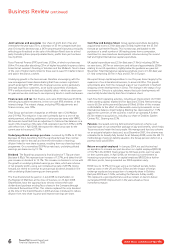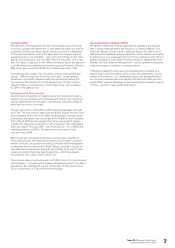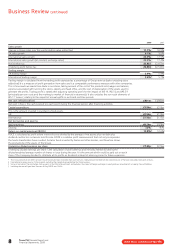Tesco 2008 Annual Report Download - page 18
Download and view the complete annual report
Please find page 18 of the 2008 Tesco annual report below. You can navigate through the pages in the report by either clicking on the pages listed below, or by using the keyword search tool below to find specific information within the annual report.
Tesco PLC Annual Report and
Financial Statements 2008
16
Health and safety risks While the safety of our staff and customers is of
the utmost importance to us, if we are unable to provide safe environments
for our staff and customers this could lead to injuries or loss of life.
We operate stringent health and safety processes in line with best practice
in our stores, distribution centres and offices, which are monitored and
audited regularly. KPIs for preventing health and safety incidents form an
intrinsic part of our Steering Wheels across the business, and performance
against these KPIs is reported quarterly. Our Group Compliance Committee
and the compliance committees in our international businesses monitor the
level of compliance with health and safety laws and our internal policies on
a regular basis.
Ethical risks in the supply chain More than 1.8 million people in over
90 countries work for direct suppliers to Tesco and the supply chain is made
of complex relationships – from individual farmers and growers through to
processors, manufacturers and distributors. At the heart of our values is our
belief that we should treat people as we like to be treated and we have a
responsibility to help workers in our supply chain enjoy fair labour standards.
We therefore require our suppliers to meet strict criteria on labour standards,
and as a founder member of the Ethical Trading Initiative (ETI) we expect
all our suppliers to follow the ETI base code and guarantee their workers the
rights set out within it. There is, however, a risk that any part of the supply
chain might not adhere to these high standards.
To minimise this risk we only work with suppliers who can demonstrate that
they are committed to the ETI code and share our values. We use Supplier
Ethical Data Exchange (SEDEX) to carry out risk assessment of all our
direct suppliers and all medium and high-risk suppliers must undergo an
extensive, independent ethical audit. We have in the last year introduced
a comprehensive programme of audit improvements, including more
unannounced audits, a new Trading Fairly strategy and an industry-leading
Auditor Recognition programme, which involves our use only of individual
auditors who have been assessed for competence. We have also sought to
involve more multi-stakeholder representatives on our audits to improve
workforce engagement and enable activists to see and feedback on our
approach. We work with suppliers to identify any problems and, where they
exist, support them in taking action to improve standards for their workers.
We have also invested heavily in building the labour standards capabilities
of our suppliers and our own commercial teams in the last year, including
rolling out extensive training, to help them identify and avoid issues before
they arise. We also workwith businesses, governments, Non-governmental
organisations (NGOs) and others to tackle complex and systemic problems
that we cannot solve on our own. As well as having a key role in the ETI we
also work closely with the Global Social Compliance Programme and other
groups in specific industries or regions, including the Wine and Agriculture
Ethical Trade Association in South Africa and the Environmental Justice
Foundation in Uzbekistan.
Fraud and compliance As the business grows in size and geographical
spread, the risk of occurrence of fraudulent behaviour by our employees
increases. Whilst the vast majority of our staff are completely honest, there
remains the potential for fraud and other dishonest activity at all levels of
the business from the shop floor to senior management.
The Group takes extensive steps to reduce this risk. Relevant accounting
and other procedures and controls at all levels are clearly set out and
audited across the business to reduce the risk of fraud. The Group gives
clear guidance on behaviour to employees through the Tesco Values and
the Code of Ethics. Internal Audit undertakes detailed investigations into all
areas of the business and highlights its findings to the Audit Committee.
The Compliance Committee formulates and monitors the implementation
of, and compliance with appropriate policies on key areas of ethical
behaviour, including fraud.
Property We have stretching targets for delivering new space in the
UK and overseas, and may face challenges in finding suitable sites and
obtaining planning or other consents to enable sites to be acquired and
developed. The complexity of many of our property developments is
increasing, especially the growing number of mixed-use schemes.
We also have to comply with design and construction standards which
vary significantly from country to country.
Our Property Acquisition Committees and other related committees in
the UK, Europe, Asia and the US closely control all aspects of the property
acquisition, planning and construction processes, to ensure that applicable
standards are met and financial risks are minimised. Our Group and
country compliance committees also monitor compliance with applicable
legal and regulatory requirements in all aspects of our property activities.
Non-food risks As the proportion of our business represented by
non-food products increases, there is a risk that a downturn in consumer
confidence may affect the level of demand for products which consumers
may regard as non-essential.
We make every effort to ensure that our non-food products are
competitively priced to offer a broad range of products ranging from value
to the luxury end of the market, in order to cater for the needs of as wide
a range of customers as possible.
IT systems and infrastructure The business is dependent on efficient
information technology (IT) systems. Any significant failure in the IT
processes of our retail operations (e.g. barcode scanning or supply chain
logistics) would impact our ability to trade. We recognise the essential role
that IT plays across our operations in allowing us to trade efficiently and
so that we can achieve commercial advantage through implementing
IT innovations that improve the shopping trip for customers and make life
easier for employees. We have extensive controls in place to maintain the
integrity and efficiency of our IT infrastructure and we share systems from
across our international operations to ensure consistency of delivery.
Regulatory and political environment We are subject to a wide variety
of regulations in the different countries in which we operate because of
the diverse nature of our business. Tesco may be impacted by regulatory
changes in key areas such as planning laws, trading hours, and tax rules as
well as by scrutiny by the competition authorities, who have been carrying
out enquiries in the UK, Ireland and elsewhere. We may also be impacted
by political developments in the countries in which we operate. We consider
these uncertainties in the external environment when developing strategy
and reviewing performance. We remain vigilant to future changes. As part
of our day-to-day operations we engage with governmental and non-
governmental organisations to ensure the views of our customers and
employees are represented and try to anticipate and contribute to
important changes in public policy wherever we operate.
Activism and terrorism A major incident or terrorist event incapacitating
management, systems or stores could impact on the Group’s ability to
trade. In addition to contingency plans, we have security systems and
processes that reflect best practice.
Pension risks The Group’s pension arrangements are an important part
of our employees’ overall benefits package especially in the UK. We see
them as a strong contributor to our ability to attract and retain good people,
our Group’s greatest asset. Since the implementation of IAS 19 there is a
risk that the accounting valuation deficit (which is recorded as a liability on
the Group Balance Sheet) could increase if returns on corporate bonds
are higher than the investment return on the pension scheme’s assets.
The Group has considered its pension risks and has taken action by reducing
risk in its investment strategy.
www.tesco.com/annualreport08
Business Review continued
























